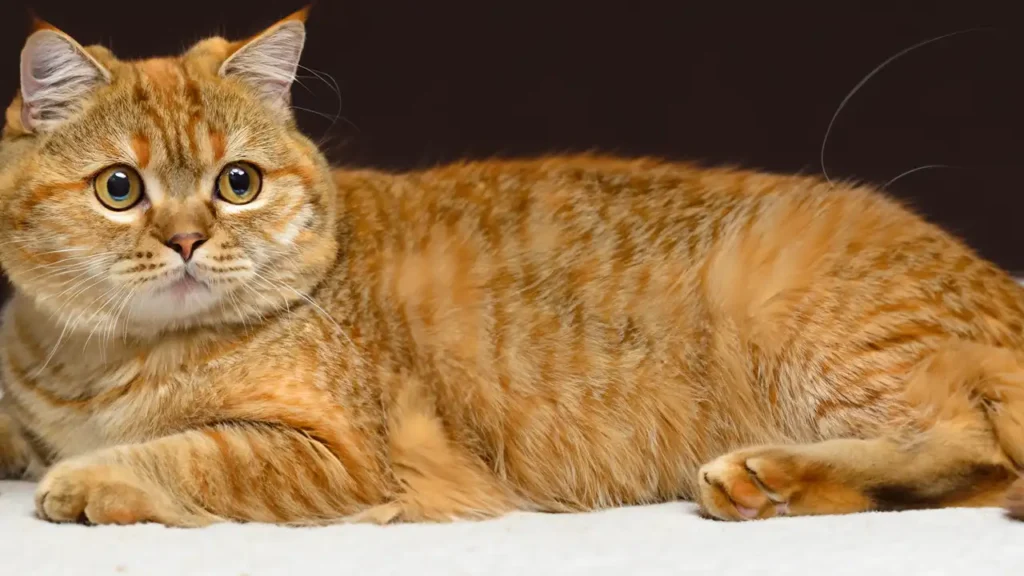In the realm of feline grace and elegance, few breeds captivate the imagination quite like the Golden British Shorthair, known by various names such as “British Shorthair Golden” and “Golden Chinchilla British Shorthair.” Originating from the picturesque landscapes of the United Kingdom, these enchanting creatures have carved a special place in the hearts of cat aficionados around the world. With their luscious golden coats, striking physical features, and endearing personalities, Golden British Shorthairs embody the epitome of feline charm and sophistication.
Join us on a fascinating expedition as we unravel the allure of the Golden British Shorthair breed. From their intriguing historical origins to their distinctive physical characteristics, and from their playful behavioral traits to their health considerations and unique training needs, this comprehensive guide aims to illuminate every facet of these exquisite felines. Whether you are a devoted cat lover, a potential pet parent, or simply an admirer of the feline kingdom, this exploration promises to shed light on the captivating world of the Golden British Shorthair, celebrating their beauty, intelligence, and the deep connections they forge with those fortunate enough to share their lives.
Table of Contents
A Brief History of the Golden British Shorthair
The true origins of the Golden British Shorthair cat are shrouded in mystery. Some speculate that the first Golden British Shorthair cat came about from a spontaneous genetic mutation in a litter of traditional British Shorthairs, producing a kitten with a lustrous golden coat. Efforts to reproduce the golden lines were made by dedicated breeders, and over time, the Golden British Shorthair was established as a distinct breed.
Others suggest the Golden British Shorthair descended from the first British Shorthairs that were imported to America in the early 1900s. Selective breeding of the golden-colored cats produced over generations led to the Golden British Shorthair we know today. Whatever the exact origins, the Golden British Shorthair is now recognized by cat registries as a unique breed of its own.
An Overview of the Golden British Shorthair’s Physical Characteristics

The Golden British Shorthair has a powerfully built yet cuddly body with a broad chest, thickset limbs, and rounded paws. Their most distinctive feature is the round, chubby face with full cheeks and a pronounced jowl giving them a sweet expression.
The coat is dense, plush, and short with a brilliant gleaming golden hue. Shades can range from pale golden to deep coppery tones. The soft, cushy fur retains a thick undercoat even in adulthood, lending a puffed, woolly texture.
Eyes are typically copper, gold, or green to complement the coat color. Some prize the vivid green-eyed variety. Ears are medium-sized, widely set, and rounded at the tips. The tail is medium to long in length, tapering slightly at the end.
Males are generally larger than females. Most Golden British Shorthair weighs 8-17 pounds when fully matured. Their round facial features, combined with a muscular yet cuddly body and lustrous golden coat give the Golden British Shorthair a distinctive and majestic appearance.
The Captivating Personality of the Golden British Shorthair
What makes the Golden British Shorthair so endearing is its easy-going and devoted personality. They thrive on affection from their families and will follow their favorite people around the house just to be near them. While not overly needy, they do appreciate attention and enjoy curling up on laps when given the chance.
Golden Shorthairs are intelligent and can even learn tricks or play fetch if properly motivated. They get along well with respectful children and other pets when properly introduced. With early socialization, they become well-adjusted to guests, strangers, and new environments.
These cats do have a touch of their British roots, tending to be somewhat reserved and dignified compared to more exuberant breeds. But their calm demeanor and loyalty make them a soothing, comforting presence in any household.
Grooming Needs for the Golden Coat
That striking golden coat does require regular grooming to stay lush and healthy. Plan to brush it at least weekly to remove loose hair and distribute skin oils. During seasonal shedding periods, daily brushing may be needed to keep shed fur under control.
As they are prone to tartar buildup, teeth brushing 2-3 times a week is also advised. Trim nails every 2-3 weeks to prevent overgrowth and injury. Check ears weekly for dirt buildup and wipe them out gently with a cotton ball if needed.
While the coat doesn’t mat easily, some of them enjoy an occasional bath followed by a blow dry to look their best. Always use a cat-safe shampoo and avoid overbathing which can dry out their skin.
Feeding Time for the Golden British Shorthair
They need a balanced diet rich in protein to thrive. A high-quality dry kibble formulated specifically for British breed cats is recommended as a dietary foundation. Provide measured portions based on your cat’s age, weight, and activity levels.
Give them fresh water daily, changing it frequently to encourage good hydration. While not usually overeaters, it’s wise to avoid free-choice feeding to prevent obesity.
Twice daily scheduled mealtimes work well for most of them. Treats should be limited to prevent weight gain but can be used sparingly as rewards during training and playtime. Overall, maintaining an ideal weight through proper nutrition and portion control is key for their health.
Exercise and Play Requirements
This breed sturdy tends to have a more relaxed activity level compared to some breeds but still needs daily exercise and playtime. Aim for at least 15-20 minutes split into 2-3 play sessions per day to keep your cat engaged both physically and mentally.
Puzzle feeders, treat balls, feather wands, laser pointers, and fetch toys are all great ways to stimulate a Golden British Shorthair. They particularly enjoy games of fetch and will excitedly retrieve small balls or toy mice. Cat trees, tall scratching posts, and window perches also allow them to climb and survey their territory when the mood strikes.
While playful and energetic as kittens, adult Golden British Shorthairs are usually content with moderate activity levels. However interactive play remains important to prevent boredom and excess weight gain. Give your cat a mix of independent toys and quality time playing together each day.
Health and Lifespan of the Golden British Shorthair
Reputable breeders screen for health issues, but Golden British Shorthairs are still predisposed to certain conditions, including:
- Hypertrophic cardiomyopathy: This heart disease causes thickening of heart walls. Annual vet checkups help detect it early.
- Polycystic kidney disease: Cysts on the kidneys can eventually lead to kidney failure. Genetic testing helps identify affected cats.
- Hip dysplasia: Abnormal hip joint development causing arthritis. Keeping your cat slim minimizes strain on joints.
- Gingivitis: Tartar and gum inflammation. Daily teeth brushing and veterinary cleanings help prevent it.
With excellent care, the Golden British Shorthair has a typical lifespan of 12-15 years or more. Providing excellent nutrition, regular vet care, and maintaining a healthy weight are all key to your cat’s longevity.
Training Tips for Golden British Shorthairs
Intelligent and moderately active, Golden British Shorthairs take well to training with a consistent, positive approach. Use treats, praise, and play as rewards during each brief 5-10-minute session, ending on a positive note.
Puzzle feeders, treat balls, feather wands, laser pointers, and fetch toys are all great ways to stimulate them. They particularly enjoy games of fetch and will excitedly retrieve small balls or toy mice. Cat trees, tall scratching posts, and window perches also allow them to climb and survey their territory when the mood strikes.
While not the most vocal of breeds, some Golden British Shorthairs can learn simple voiced commands or tricks like “sit” or “come.” Always be patient and keep training low-key to get the best results with these mellow, good-natured cats.
Finding Your Golden British Shorthair
As a relatively new pedigree breed, Golden British Shorthairs are still uncommon. Reach out to specialized breeders to locate available kittens or adults. Expect health guarantees, registration papers, and genetic screening.
Adoption is another excellent way to bring home a Golden British Shorthair. Check local rescues and shelters, looking for “British Shorthair mix” cats exhibiting the breed’s golden coat and body type.
Whether purchasing or adopting, visit the cattery or shelter multiple times to interact with the cat and ensure it has an amenable personality and is a good fit for your lifestyle.
Conclusion
With its golden radiance and amiable personality, it’s easy to see why the Golden Shorthair captivates cat enthusiasts. For those seeking a devoted yet dignified companion, this breed makes an excellent addition to any household. Show your Golden Shorthair daily affection while providing excellent care, and be rewarded with a comforting, majestic friend.
FAQs
Q: Why are golden British Shorthair so expensive?
The rarity of the breed, significant breeding costs, their desirable traits and beauty, and the health care provided by reputable breeders all contribute to the high price. Their popularity and low supply drives demand. Those wanting a more affordable companion can check shelters and rescues.
Q: How much is a cat British Shorthair Golden?
Pet quality golden British Shorthair kittens typically range from $1,000 – $1,500. Show and breeding quality kittens can cost $2,500 – $3,500+ from top breeders. Adopted adults are less, around $800 – $1,200. For a more affordable option, shelters/rescues offer kittens around $50 – $200. Prices vary based on the breeder, pedigree, location, and cat attributes.
Q: What is the personality of a golden British Shorthair?
The Golden British Shorthair is known for its gentle, easy-going, and affectionate personality. These cats are devoted to their families and enjoy spending time with them. They are not overly demanding but appreciate attention and often follow their favorite people around the house. Golden British Shorthairs are intelligent and can learn tricks or play fetch. They establish good relationships with both children and other pets when introduced appropriately. While somewhat reserved, they are loyal, and calm, and make comforting companions in any household.


